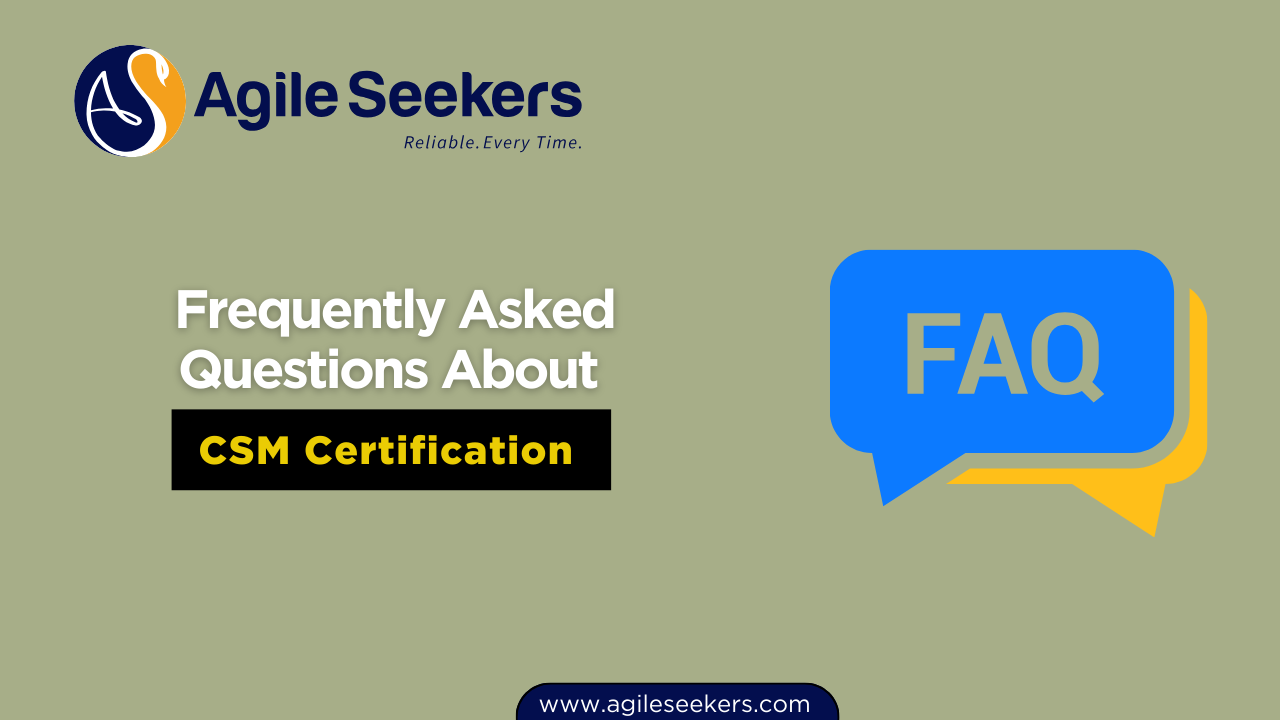Top 10 Frequently Asked Questions About CSM Certification

Scrum has become the go-to framework for Agile teams looking to improve delivery, collaboration, and value. As organizations shift to Agile ways of working, the demand for Certified Scrum Masters (CSM) continues to rise. Whether you're a beginner or transitioning into a Scrum Master role, you probably have a lot of questions. This blog answers the most common questions professionals ask before pursuing the CSM certification.
1. What Is CSM Certification?
CSM stands for Certified Scrum Master, a globally recognized credential offered by Scrum Alliance. This certification validates your understanding of Scrum values, principles, and practical implementation. It’s ideal for aspiring Scrum Masters, team leads, and anyone who wants to facilitate Agile practices within an organization.
Scrum Alliance, a nonprofit organization, created the CSM certification to help professionals apply Scrum effectively. You can learn more directly from Scrum Alliance’s official site.
2. Who Can Take the CSM Certification?
The Certified Scrum Master training program is open to anyone interested in Agile or Scrum. There are no strict prerequisites. However, it benefits professionals in roles such as:
-
Scrum Masters
-
Project Managers
-
Product Owners
-
Business Analysts
-
QA/Testers
-
Developers
Even if you’re switching careers or starting fresh in Agile, the CSM is a solid entry point.
3. What’s Covered in the CSM Training?
The CSM training includes a mix of theoretical concepts, case studies, and interactive exercises. A Scrum Alliance-certified trainer leads the two-day workshop, which typically includes:
-
Agile Manifesto and Scrum fundamentals
-
Scrum roles: Scrum Master, Product Owner, and Developers
-
Scrum events: Sprint, Daily Scrum, Sprint Review, Sprint Retrospective
-
Scrum artifacts: Product Backlog, Sprint Backlog, Increment
-
Servant leadership and facilitation techniques
-
Real-world simulations and role-based learning
By the end of the training, you’ll understand how to help teams succeed using Scrum practices.
4. Is the CSM Exam Difficult?
The CSM exam is not overly difficult if you actively participate in the training and study the course material. The exam includes:
-
50 multiple-choice questions
-
A 60-minute time limit
-
A passing score of 74% (i.e., 37 out of 50 correct answers)
The exam is open-book, and you can take it online after completing the course. Most candidates pass on their first attempt, especially when they attend a well-structured CSM certification training.
5. What Is the Cost of CSM Certification in India?
The cost of CSM certification in India typically ranges from ₹19,000 to ₹27,000, depending on the training provider, mode (online or classroom), and added features like exam retakes or extra learning materials. This fee generally includes:
-
2-day training by a Certified Scrum Trainer (CST)
-
CSM exam access
-
Scrum Alliance membership for 2 years
-
Learning materials and tools
Ensure you check what's included before enrolling. Avoid providers offering training without Scrum Alliance accreditation.
6. How Long Does It Take to Get Certified?
From start to finish, you can complete the certification process within a few days. Here's a typical timeline:
-
Attend a 2-day CSM training workshop
-
Receive an email with exam access from Scrum Alliance
-
Take the exam (available immediately after training)
-
Receive your certification instantly after passing
This makes it one of the most accessible Agile certifications for beginners.
7. What Are the Benefits of Becoming a Certified Scrum Master?
A CSM certification offers multiple advantages for professionals and organizations alike:
-
Enhances credibility and marketability in Agile roles
-
Opens doors to Scrum Master, Agile Coach, and team lead roles
-
Equips you with practical tools to improve team productivity
-
Demonstrates commitment to continuous learning
-
Helps align Agile implementation with Scrum best practices
According to LinkedIn’s emerging jobs report, Scrum Master remains a high-demand role across industries.
8. What Is the Validity of the CSM Certification?
The CSM certificate remains valid for two years from the date of issuance. After that, you’ll need to renew it by:
-
Paying a renewal fee of $100
-
Earning Scrum Education Units (SEUs)—minimum of 20 SEUs required
You can earn SEUs by attending webinars, writing blogs, mentoring, or attending Agile events.
More on SEUs can be found on the Scrum Alliance continuing education page.
9. What’s the Career Path After CSM?
After completing the CSM certification, professionals often consider advanced certifications such as:
-
Advanced Certified ScrumMaster® (A-CSM)
-
Certified Scrum Professional - ScrumMaster® (CSP-SM)
-
Certified Scrum Product Owner® (CSPO)
-
ICAgile Agile Coaching (ICP-ACC)
Each level deepens your expertise and widens your career opportunities. You can also shift into coaching, transformation, or Agile leadership roles with experience.
10. Where Can I Take the Best CSM Certification Training?
Choosing a trusted training partner is crucial. Look for:
-
Courses led by Certified Scrum Trainers (CSTs)
-
Practical, interactive learning formats
-
High exam pass rates
-
Post-training support and career guidance
AgileSeekers offers top-tier CSM certification courses that blend real-world case studies with expert-led instruction. Their workshops focus on helping you implement Scrum confidently in your team or organization.
Final Thoughts
Getting your CSM certification is more than just passing a test. It's about learning how to support Agile teams, drive change, and deliver value in complex environments. Whether you're a project manager, team lead, or just curious about Agile, this certification can open doors and elevate your professional journey.
By investing in quality Certified Scrum Master training, you’re setting yourself up for success in Agile roles—and giving your team the guidance it needs to thrive.
Also Check out the CSM Certification Cost




















